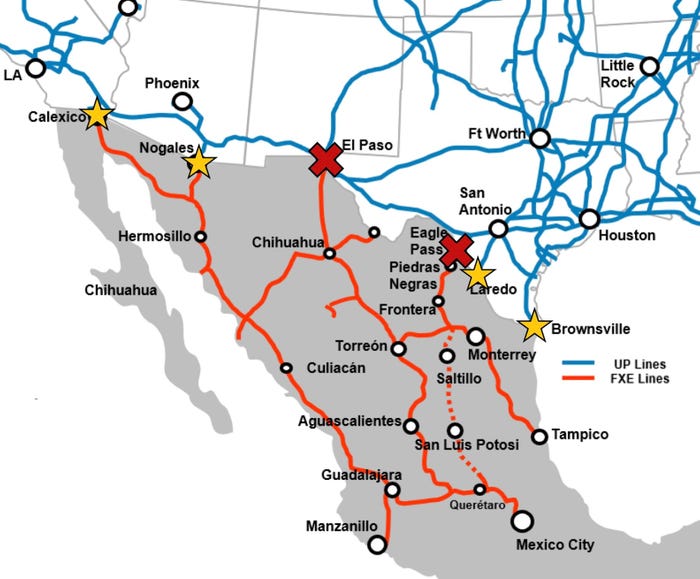Stakeholders, lawmakers call for reopening of Texas border railway crossings
Ag and industrial commodities, food and beverages, automotive vehicles and parts, consumer goods all being impacted.

Several groups, railroad companies and government leaders are calling for the immediate reopening of two rail bridges in Texas after they were closed this week to help curb a surge in migrants coming across the border.
After observing a recent resurgence of smuggling organizations moving migrants through Mexico via freight trains, the U.S. Customs & Border Patrol is “taking additional actions to surge personnel and address this concerning development, including in partnership with Mexican authorities,” the agency said in a statement.
One such action was temporarily suspending operations on Dec. 18 at the international railway crossing bridges in Eagle Pass and El Paso, Texas, in order to redirect personnel. However, that action immediately began affecting the North American supply chain.

Credit: Union Pacific
In September, Mexican railway operator Ferromex (FXE) had temporarily suspended 60 trains on its south-north routes because of an increasing number of migrants climbing aboard railcars.
This week's CBP decision most directly and immediately impacts operations for two Class I railroads: Union Pacific and BNSF. Combined, the two carriers operate 24 trains daily at these crossings, moving agricultural products, automotive parts, finished vehicles, chemicals, consumer goods and more to customers spanning the continent. But the American Association of Railroads said that, ultimately, every railroad is affected by this sudden shutdown of operations, since all carriers interchange goods across the North American rail network.
In a statement, Union Pacific said the locations closed represent 45% of its cross-border business and include goods critical to the U.S. economy.
“Every day the border is closed, Union Pacific is forced to embargo customers’ goods on more than 60 trains, or nearly 4,500 rail cars, with an equivalent of goods being held in Mexico. Union Pacific is doing everything possible to stage trains and work with customers to prevent congestion at the border,” the company said, adding that the overall economic impact of the border closure is more than $200 million each day.
The company relayed that grain is being held in six Midwestern states due to the closures but added that food and beverages, automotive vehicles and parts, consumer goods and industrial commodities are also being impacted.
BNSF said while it is committed to border security as well as protecting the U.S. economy, it was disappointed with CBP’s decision.
“We are in regular communication with CBP and other federal agencies urging both crossings be reopened immediately,” BNSF stated. “We are also working closely with our customers to meet their needs and to prevent further congestion stemming from the crossing closures. Every day of closure increases the impact to the supply chain for critical commodities, including automobiles, industrial products and grain.”
The National Grain & Feed Association (NGFA) and the North America Export Grain Association (NAEGA) issued a statement following the closure after becoming aware “of critical tightness in feeding supplies for several livestock feeders in Mexico,” as well as grain trains in multiple states being held for shipment due to CBP’s embargo.
“The critical nature of this issue is growing by the hour, particularly for those livestock feeders that may run short of feed,” they warned.
According to the groups, the North American market and grain trade supply chain are deeply intertwined. USDA data shows rail represents 64% of grain and oilseed exports to Mexico, including 15,565,138 metric tons of grains and oilseeds exported via rail in 2021 and 3.45 mt of grains and oilseeds in the third quarter of 2023.
“We are deeply concerned by the developing situation and request that CBP work with us, the railroads and other federal partners to develop a commonsense and expedient solution that reopens this critical mode of agricultural transportation for the U.S. and North American markets,” the groups stated.
On Dec. 20, NGFA and 45 other members of the Agricultural Transportation Working Group sent a letter to Homeland Security Secretary Alejandro Mayorkas urging the immediate opening of the El Paso and Eagle Pass international rail crossings.
“The closure of the rail crossings is rippling back into the U.S. supply chain and having negative impacts on the U.S. economy,” the letter noted. “While we are sympathetic to the humanitarian needs on the U.S./Mexico border, the interconnectedness of the North American supply chain means the closure of rail crossings causes backups on the rail system as far north as the U.S./Canada border and hurts our economy.”
Nearly two-thirds of all U.S. agricultural exports to Mexico move via rail, the groups noted in the letter. Mexico was the United States’ second largest export market in 2022 with $28.5 billion in sales. Each day the crossings are closed nearly 1 million bushels of grain exports are potentially lost along with export potential for many other agricultural products.
Joni Casey, president and CEO of Intermodal Association of North America, joined the calls, saying, "While acknowledging the ongoing border issues, it is imperative that the flow of freight remains unencumbered throughout these challenges. The reopening of these border crossings is vital to reinstating the essential flow of trade between the U.S. and Mexico.”
Association of American Railroads president and CEO Ian Jefferies also joined the calls for reopening, saying the situation “cannot be overstated.”
“There are not separate U.S. and Mexican rail networks; there is only one interconnected North American rail network. Every day the border remains closed unleashes a cascade of delay across operations on both sides of the border, impacting customers and ultimately consumers,” he said.
Transportation and Infrastructure Committee Chairman Sam Graves, R-Mo., and Railroads, Pipelines & Hazardous Materials Subcommittee Chairman Troy Nehls, R-Texas, issued a joint statement on Dec. 19 blaming the Biden Administration’s “failed immigration policies and unwillingness to stem the flow of illegal migration” for the situation.
“This isn’t the first time this year that CBP was forced to close down freight rail crossings in order to deal with the challenges posed by the Biden border crisis, and the problems are getting worse,” they said. “A prolonged shutdown of the tracks will have a disastrous impact on the supply chain and commerce, and this is just one of many reasons this Administration needs to get this border crisis under control immediately.”
Read more about:
RailroadAbout the Author(s)
You May Also Like





